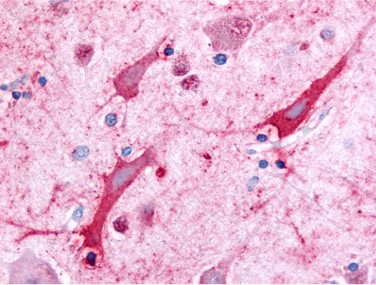Anti-Ceramide Kinase Antibody (13805)
Data
- -
- -
Antibody DetailsProduct DetailsReactivity Species Human Host Species Rabbit Immunogen Synthetic peptide conjugated to KLH. Product Concentration Lot Specific Formulation PBS containing 0.1% sodium azide State of Matter Liquid Product Preparation Purified by peptide immuno-affinity chromatography Storage and Handling This antibody is stable at 4°C (short- term) and -70°C (long-term). Country of Origin USA Shipping Next Day 2-8°C Applications and Recommended Usage? Quality Tested by Leinco Immunohistochemistry: Use at 20ug/ml. Each investigator should determine their own optimal working dilution for specific applications. See directions on lot specific datasheets, as information may periodically change. DescriptionSpecificity Rabbit Polyclonal Antibody specific to Ceramide Kinase Background Ceramide kinase (CERK), which phosphorylates ceramide to produce ceramide 1-phosphate (C1P), was first described as a Ca+2-stimulated lipid kinase that copurified with brain synaptic vesicles. CERK activity has been reported in HL60 cells, mast cells, and neutrophils. CERK is involved in phagolysosome formation in plymorphonuclear leukocytes and also in liposome fusion. C1P has been reported to have mitogenic effects. More recently, C1P was found to induce arachidonic acid release and prostanoid synthesis. Antigen DetailsFunction Catalyzes specifically the phosphorylation of ceramide to form ceramide 1-phosphate (PubMed:11956206, PubMed:16269826, PubMed:19168031). Acts efficiently on natural and analog ceramides (C6, C8, C16 ceramides, and C8-dihydroceramide), to a lesser extent on C2-ceramide and C6-dihydroceramide, but not on other lipids, such as various sphingosines (PubMed:11956206, PubMed:16269826, PubMed:19168031). Shows a greater preference for D-erythro isomer of ceramides (PubMed:16269826). Binds phosphoinositides (PubMed:19168031). {PubMed:11956206, PubMed:16269826, PubMed:19168031}. NCBI Gene Bank ID UniProt.org Research Area Enzymes References & Citations |
 Products are for research use only. Not for use in diagnostic or therapeutic procedures.
Products are for research use only. Not for use in diagnostic or therapeutic procedures.



